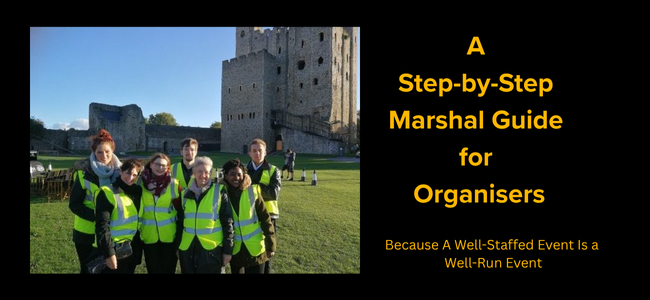
How to Staff an Event: A Step-by-Step Guide for Organisers
Don’t Let Event Marshal Staffing Be an Afterthought
No matter how brilliant the entertainment or how detailed the planning, an event will only run smoothly if it’s well-staffed. Marshals and stewards are essential to keeping guests safe, ensuring things run on time, and making sure everyone leaves with a positive experience.
In this guide, we’ll show you how to build your event staffing plan from start to finish, so nothing gets missed—from early planning to the final pack-up.
1. Start Planning Early: Staffing Shouldn’t Be Last on the List
The earlier you begin planning your event team, the better. Staffing isn’t just a box to tick—it’s integral to the success (and legality) of your event.
Here’s what to think about at the very beginning:
Expected attendance: A larger crowd means more eyes and ears on the ground.
Venue type: Indoor, outdoor, public space or private land all bring different needs.
Licensing requirements: If your event includes alcohol, traffic management, or security risks, you’ll need qualified staff.
Emergency planning: The number and type of staff needed often depend on your risk assessment.
Start conversations with a reputable marshals and stewards agency early—ideally 2–3 months ahead for large events.
2. Understand the Roles You Need
Not all event staff are the same. Here’s a quick overview of who does what:
👷 Marshals
Often deployed at public events (races, parades, car shows), they’re responsible for managing movement, overseeing road closures, and maintaining general safety—especially outdoors.
🦺 Stewards
The friendly faces helping with directions, checking tickets, assisting with lost children, and responding to minor incidents. Stewards help your event feel safe and welcoming.
🔐 SIA-Licensed Security
Required for high-risk areas, alcohol-related zones, or where crowd control may be challenging.
⛑️ First Aid Support
While not always mandatory, it’s strongly advised to have qualified first aiders, especially for medium-to-large events.
Hiring the right mix of people ensures your event runs efficiently while meeting legal obligations.
3. Build a Realistic Staffing Timeline
When should you start hiring? Here’s a guide:
10–12 Weeks Before
Finalise your event layout and risk assessment.
Identify the types and number of staff required.
Start getting quotes from staffing providers.
6–8 Weeks Before
Confirm bookings with your chosen marshals and stewards agency.
Share site maps and safety plans with your provider.
Schedule pre-event meetings or site visits if needed.
2 Weeks Before
Review final plans and shift schedules.
Ensure staff have access to venue info and contact lists.
1–2 Days Before
Conduct a briefing or walk-through for key personnel.
Double-check radio comms, signage, and incident protocols.
On the Day
Have a point of contact or supervisor coordinating teams.
Provide regular updates or check-ins throughout the day.
After the Event
Include staff in the debrief process.
Record any incidents, feedback, or improvements for next time.
4. Briefing Is as Important as Hiring
Even the most experienced stewards and marshals need to be properly briefed to be effective. Your staff should be confident with:
Emergency evacuation plans
Site layout and key zones
Radio protocols and communication
Lost child or vulnerable person procedures
Any known risks or issues (e.g. uneven terrain, noisy zones)
Most professional agencies will handle this for you, but if you’re managing in-house, make it a priority. A 15-minute briefing can make all the difference.
5. Plan for Flexibility
Events rarely go 100% to plan. Someone might be late. The weather might shift. You could get more attendees than expected.
A good staffing plan builds in flexibility:
Keep reserve staff on standby, especially for large or high-risk events.
Choose an agency that can scale up or adapt quickly.
Allow for longer shifts or extra help during peak times (e.g. opening gates, headline acts, end-of-day departures).
6. Don’t Forget the End of the Event
Staffing needs don’t disappear once the entertainment finishes. In fact, the final hour can be the most chaotic.
Make sure you’ve planned for:
Exit management and crowd dispersal
Clean-up supervision
Traffic control for car parks or nearby roads
Handling lost property or post-event issues
Final safety sweep of the venue
Some organisers underestimate how important a calm, structured end is—it’s often the last impression your attendees will take away.
7. Work with Professionals
While volunteers can be useful, they should never replace trained staff for key roles. Professional marshals and stewards:
Have relevant training (e.g. conflict management, first aid, fire safety)
Are vetted and insured
Know how to remain calm under pressure
Can brief and coordinate others
Working with an agency like Marshals & Stewards Agency means peace of mind. You know your event is in safe hands.
A Well-Staffed Event Is a Well-Run Event
Event success isn’t just about headliners and fancy lighting—it’s about what happens behind the scenes. With the right marshals, stewards, and support in place, your event can be safe, organised, and memorable for all the right reasons.
Start early, plan realistically, and work with a trusted provider like Marshals & Stewards Agency. From planning to pack-up, you’ll know your event is in capable hands.